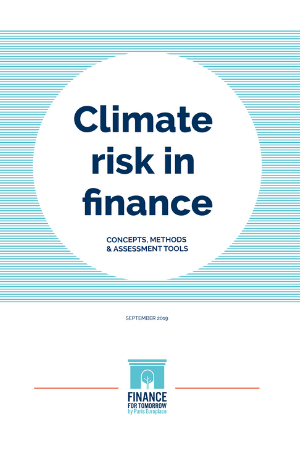Publication Launch: Climate risk in finance
How to manage climate risk?
If you want to develop your skills on concepts, methods and analysis tools, download our new report!
The scientific community is unanimous about the magnitude of the environmental and climate crisis. Facing the urgency, the Paris Agreement sets up the international ambition for action. It establishes the need to shift financial flows to limit global warming under 2°C. The financial sector, now at the centre stage of climate negotiations, has become aware of its responsibility in anticipating risk and developing economic opportunities for the ecological transition. However, there is an urgent need to step things up, as the situation continues to deteriorate and the “cost of inaction” to increase. To live up to the stakes, we must incorporate climate considerations into decision-making processes. This will imply rethinking the tools of the financial industry. In particular, it is necessary to develop convergent models to evaluate climate risk, to be used collectively by the whole industry.
Whilst the European Commission unrolls its Action Plan for Sustainable Finance, Finance for Tomorrow wants to promote concrete strategies and tools to manage climate risk, at both the European and International levels. This work aims to leverage the French experience, its renowned technical expertise and the innovative initiatives of its market players. In France, the development of a pioneer ecosystem was supported by national regulation which has paved the way for climate transparency requirements. This momentum is about to be strengthened with the launch of an Observatory, which will be steered by Finance for Tomorrow and professional federations, to monitor the Paris Financial Marketplace progressive alignment with climate objectives.

This work fits into this dynamic. With the actors of the Paris financial centre gathered in a “Climate Risk & Methodologies” working group, Finance for Tomorrow has produced this report to share key data and provide better understanding of the issues to everyone concerned by climate risk management in the financial sector, whether they be investors, companies or other stakeholders. This collective work is unprecedented, at least for such a broad perimeter, and ought to help better identify and, hopefully, streamline methodologies and indicators for funding the ecological transition and decarbonizing portfolios. This work was a bet on information sharing and transparency.
Challenge completed: by presenting available tools and solutions, this document provides the keys to developing a common understanding and a long-term strategic vision, not only for the Paris Financial Marketplace but also to contribute to European work. The methodologies map provides a useful overview of the market, decoding a landscape that was until now only accessible to experts.